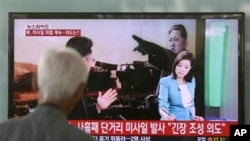North Korea has fired short-range projectiles into its coastal waters for a third consecutive day, defying international calls for restraint.
South Korea says it is trying to determine whether the North had launched guided missiles or rockets into the East Sea, also called the Sea of Japan.
Pyongyang has fired six short-range projectiles in three days, including three missiles on Saturday and one Sunday.
The launches have drawn criticism from South Korea, the United States, Russia and U.N. Secretary-General Ban Ki-moon. All appealed to the North to refrain from provocative behavior.
North Korea rejected those calls. It said the launches were part of military training exercises that are the "indisputable right" of any sovereign nation.
Earlier this year, North Korea repeatedly threatened to attack the South and the United States with nuclear strikes in response to what it viewed as provocative U.S.-South Korean military exercises.
Security analyst Brad Glosserman of the Hawaii-based Pacific Forum research group said North Korea appears to be firing short-range missiles in the hope of sending a signal to world powers.
"To say this is part of a plan I think perhaps gives North Korea a little too much credit. But, there is no doubt that North Korea has a broader strategy to remind the world of its presence and to make sure that it stays focussed, and as far as North Korea is concerned, hopefully force those negotiating partners to the table, to negotiate on terms that it considers more favorable," Glosserman said.
Glosserman said North Korea likely does not want tensions to subside to the point where world powers "move on and think about other things."
South Korea says it is trying to determine whether the North had launched guided missiles or rockets into the East Sea, also called the Sea of Japan.
Pyongyang has fired six short-range projectiles in three days, including three missiles on Saturday and one Sunday.
The launches have drawn criticism from South Korea, the United States, Russia and U.N. Secretary-General Ban Ki-moon. All appealed to the North to refrain from provocative behavior.
North Korea rejected those calls. It said the launches were part of military training exercises that are the "indisputable right" of any sovereign nation.
Earlier this year, North Korea repeatedly threatened to attack the South and the United States with nuclear strikes in response to what it viewed as provocative U.S.-South Korean military exercises.
Security analyst Brad Glosserman of the Hawaii-based Pacific Forum research group said North Korea appears to be firing short-range missiles in the hope of sending a signal to world powers.
"To say this is part of a plan I think perhaps gives North Korea a little too much credit. But, there is no doubt that North Korea has a broader strategy to remind the world of its presence and to make sure that it stays focussed, and as far as North Korea is concerned, hopefully force those negotiating partners to the table, to negotiate on terms that it considers more favorable," Glosserman said.
Glosserman said North Korea likely does not want tensions to subside to the point where world powers "move on and think about other things."





